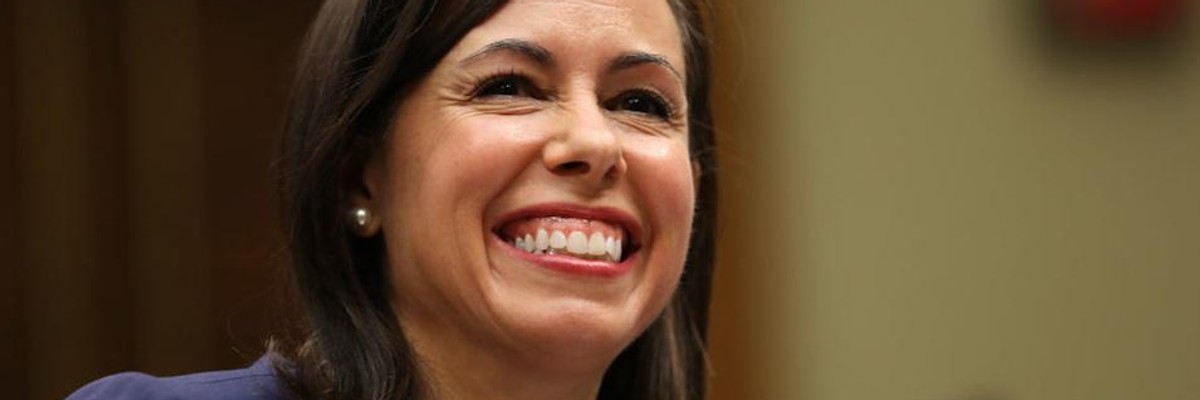Open internet advocates on Wednesday welcomed the Federal Communications Commission's plan to vote on reestablishing FCC oversight of broadband and restoring net neutrality rules on April 25.
"The pandemic proved once and for all that broadband is essential,"
said FCC Chair Jessica Rosenworcel, who announced the restoration effort in September, shortly after the U.S. Senate confirmed Anna Gomez to a long-vacant seat on the five-member commission. The following month, the pair joined with Commissioner Geoffrey Starks to start the rulemaking process.
"After the prior administration abdicated authority over broadband services, the FCC has been handcuffed from acting to fully secure broadband networks, protect consumer data, and ensure the internet remains fast, open, and fair," Rosenworcel explained Wednesday. "A return to the FCC's overwhelmingly popular and court-approved standard of net neutrality will allow the agency to serve once again as a strong consumer advocate of an open internet."
The three Democratic commissioners aim to reverse a deeply unpopular rollback that happened under former Republican President Donald Trump by reclassifying broadband as a public service under Title II of the Communications Act and preventing internet service providers (ISPs) from blocking legal content, creating fast lanes, and throttling speeds.
"We've been fighting for this moment since Trump's FCC threw out strong Title II rules and abandoned net neutrality back in 2017—and really for nearly 20 years since net neutrality first came under threat," Free Press Action co-CEO Craig Aaron
said of the upcoming vote. "We welcome and celebrate the FCC's decision to move ahead and make sure that internet users will again be protected against harms by big phone and cable companies like AT&T, Comcast, and Verizon."
"Under these strong but flexible FCC rules, every ISP will be responsible for making resilient networks available to people on just and reasonable terms," he noted. "And they won't be able to pick and choose what any of us can say or see online. Net neutrality is a guarantee that the phone and cable companies will carry our data across the internet without undue interference or unreasonable discrimination."
Aaron warned that "without this clear authority over broadband access, the FCC is vastly weakened in its ability to protect internet users from ISPs' privacy invasions, promote broadband competition and deployment, and take action against hidden junk fees, data caps, and billing rip-offs."
Public Knowledge legal director John Bergmayer similarly
applauded the commission's effort, stressing that "broadband is now a necessity for work, education, entertainment, healthcare, social connection, and civic engagement."
"Title II classification is the foundation of net neutrality," Bergmayer said. "With this legal tool, the FCC can reassert its role as the nation's top cop on the broadband beat. It will help the FCC more fully address
digital redlining, ensuring that broadband access is not denied or degraded to low-income areas, or based on people's race or other protected characteristics."
"It will give the FCC clearer authority to promote
network reliability and resiliency, so that users have a consistent internet experience that is ready for times of crisis and recovers quickly from outages," he continued. "It will also help the FCC combat cyber attacks and address other national security risks that could cripple our increasingly internet-dependent economy and society."
"Title II is also a pro-competition tool. It will help the FCC streamline the deployment of new broadband networks and
reduce barriers to competition," Bergmayer added.
The FCC's vote is scheduled to happen just months away from the November presidential election, in which Trump is expected to again face Democratic President Joe Biden, who
called for restoring net neutrality with a 2021 executive order.
"The internet is a gateway to democracy for many and every voter has the right to a free and fair internet. From looking up information about candidates to finding polling sites, this net neutrality proposal will make it easier for every voter to participate in our modern democracy," said Common Cause Media & Democracy Program director Ishan Mehta.
"We strongly encourage the FCC to restore net neutrality and return control of the internet to the people," he added. "Especially in a major election year, the FCC must do all it can to protect every voter's right to basic information online."
Former FCC Commissioner Michael Copps, now a special adviser to Common Cause, agreed that the pending rules are especially important for those participating in elections.
"A healthy democracy requires a well-informed and educated public, but that's not possible without an open and accessible internet," he said. "We look forward to strengthening a healthy communications ecosystem for all voters."

